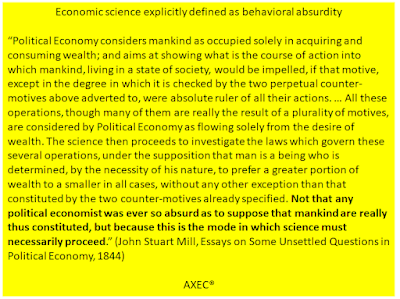Blog-Reference
Since each economist starts from some premises, all economists apply — consciously or unconsciously, correctly or incorrectly — the axiomatic method. Keynes, of course, was aware of the history of economic thought: “To Senior belongs the signal honor of having been the first to make the attempt to state, consciously and explicitly, the postulates that are necessary and sufficient in order to build up … that little analytic apparatus commonly known as economic theory, or to put it differently, to provide for it an axiomatic basis.” (Schumpeter, 1994, p. 575)
Political economists start from implicit value judgments (the market system works better, capitalism is unjust, etc.) and then argue their case. These kinds of value judgments may emerge as the conclusion of the analysis, but it is inadmissible to put them into the premises. Theoretical economists accept that each theory has a kind of architecture and state their premises explicitly: “Everyone uses 'theory' in multifarious senses. ... But in discriminating usage, the term generally denotes a logical edifice.” (Georgescu-Roegen, 1966, p. 108)
The correct procedure, therefore, is as follows: “The attempt is made to collect all the assumptions, which are needed, but no more, to form the apex of the system. They are usually called the ‘axioms’ (or ‘postulates’, or ‘primitive propositions’; no claim of truth is implied in the term ‘axiom’ as here used). The axioms are chosen in such a way that all the other statements belonging to the theoretical system can be derived from the axioms by purely logical or mathematical transformations.” (Popper, 1980, p. 71)
Logical consistency is not something nice to have, it is essential for applicability: “They [economists] want to contribute to the solution of urgent practical problems. ... Of course, they also pursue the consistency of the theories they make, for he who contradicts himself proves nothing.” (Klant, 1988, pp. 112-113)
The crucial part of theory building is the choice of foundational propositions: “What are the propositions which may reasonably be received without proof? That there must be some such propositions all are agreed, since there cannot be an infinite series of proof, a chain suspended from nothing. But to determine what these propositions are, is the opus magnum of the more recondite mental philosophy.” (Mill, 2006, p. 746)
One of the fundamental propositions of standard economics is a behavioral assumption that, imprudently, has been selected as an axiom: “Central to the question of formalisation is the role of the rationality axioms. The internal goal, derived from a particular form of mathematics, of developing a closed, axiomatic, mathematically-expressed theoretical system which yielded equilibrium solutions required reductionist axioms of deterministic individual behaviour.” (Dow, 1997, p. 83)
The rationality axiom implies utility maximization and profit maximization. There are several reasons why the rationality assumption cannot be accepted as an axiom but one is sufficient, it lacks the ‘requisite self-evident generality’: “But a principle that is not universally true is false. Thus the rationality principle is false. I think there is no way out of this. ... Now if the rationality principle is false, then an explanation that consists of the conjunction of this principle and a model must also be false, even if the particular model is true.” (Popper, 1994, pp. 172-173)
The irony of the Keynesian Revolution, which, in the last instance, explains its failure, is that it retained the immediate derivatives of the false rationality axiom: “Two axioms of classical economics that Keynes kept, however, and with which keeping Davidson concurs, are (1) people are self-interested and try to protect their income and wealth; and that (2) firms try to maximize profits.” (see intro)
These axioms always come with a caveat to make it clear that economists are indeed hard-nosed realists: “Not that any political economist was ever so absurd as to suppose that mankind are really thus constituted, but because this is the mode in which science must necessarily proceed.” (J. S. Mill, 2004, p. 106)
Somehow, the Post Keynesians never perceived that something had gone wrong on the way from the Euclidean to the non-Euclidean axioms. For them, and for all those interested in the proper axiomatization of Keynes' theory, I have untangled the mess in Keynes's Missing Axioms (2011).
Egmont Kakarot-Handtke
References
Dow, S. C. (1997). Mainstream Economic Methodology. Cambridge Journal of Economics, 21: 73–93.
Georgescu-Roegen, N. (1966). Analytical Economics, chapter General Conclusions for the Economist, 92–129. Cambridge: Harvard University Press.
Kakarot-Handtke, E. (2011). Keynes’s Missing Axioms. SSRN Working Paper Series, 1841408: 1–33. URL
Klant, J. J. (1988). The Natural Order. In N. de Marchi (Ed.), The Popperian Legacy in Economics, 87–117. Cambridge: Cambridge University Press.
Mill, J. S. (2004). Essays on Some Unsettled Questions of Political Economy, chapter On the Definition of Political Economy; and the Method of Investigation Proper to It., 93–125. Electronic Classic Series PA 18202: Pennsylvania State University. URL
Mill, J. S. (2006). Principles of Political Economy With Some of Their Applications to Social Philosophy, Volume 3, Books III-V of Collected Works of John Stuart Mill. Indianapolis: Liberty Fund. URL
Popper, K. R. (1980). The Logic of Scientific Discovery. London, Melbourne, Sydney: Hutchison, 10th edition.
Popper, K. R. (1994). The Myth of the Framework. In Defence of Science and Rationality. London, New York: Routledge.
Schumpeter, J. A. (1994). History of Economic Analysis. New York: Oxford University Press.
